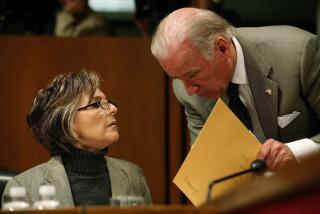Rep. Pepper, Crusader for Elderly, Dies at 88
Rep. Claude Pepper (D-Fla.), the oldest member of Congress and a man regarded by millions of elderly Americans as their personal champion, died Tuesday at the age of 88.
Pepper had been hospitalized since April 6 with what was described as a digestive disorder. A spokesman in Pepper’s office said Tuesday that he had been suffering from cancer.
President Bush and his wife, Barbara, visited Pepper at Walter Reed Army Medical Center last week to present him with the Presidential Medal of Freedom, the nation’s highest civilian award, in recognition of a long career defending “the vulnerable among us.”
Despite his ailment, Pepper, known for his vibrant energy and his strong opinions, left the hospital earlier this month to visit the National Institutes of Health so that he could see the headquarters building renamed for him.
Pepper is credited with having more impact than any other member of Congress on federal programs and protections for the aged and the infirm.
He led the successful drive in Congress to make mandatory retirement illegal and used his post as chairman of the House Rules Committee to fight attempts to restrain Social Security and Medicare benefits. His many crusades made the visage of his bulbous red nose and sonorous voice a common presence on political platforms and television screens.
“Claude Pepper was one of America’s political giants of this century,” said Sen. Bob Graham (D-Fla.) after the announcement of his death.
Said Rep. Richard A. Gephardt (D-Mo.): “I have never met a more dedicated or enthusiastic champion of the people than Claude Pepper.”
Admiring Democrats attributed in part his passionate defense of Social Security benefits against potential cutbacks for the Democrats’ surge in House seats in 1982 and the recapture of the Senate majority in 1986.
Unabashed Liberal
In the Reagan-Bush era, when political liberalism and expensive federal programs became prime targets for attack, Pepper--a New Dealer first elected to Congress in 1936--remained an unabashed liberal. His last unfinished initiative was an effort to fashion a new government benefit to provide taxpayer-financed care for those confined at home by illnesses and to help the middle class with the crushing burden of nursing home costs.
Some newer members of Congress have privately complained that Pepper was out of touch with the public’s changing view of government’s role in society. But Pepper, who kept an autographed picture of President Franklin D. Roosevelt on the mantel in his House office, stubbornly refused to shift his ground.
“My brand of liberalism has a bedrock belief in life--in a better life not just for the elite but for all,” he wrote in his 1987 autobiography, “Pepper, Eyewitness to a Century.” “It rejects the notion that those who are underprivileged have earned their fate, that hard work inexorably leads to success.”
Pepper served in the Senate during the Roosevelt and Harry S. Truman administrations, then went into political exile after a bitter primary defeat in 1950.
Found New Niche
He returned as a member of the House in 1962 and soon found a new niche, using the chairmanship of the Select Aging Committee to wage high-profile campaigns for his issues. He became a master of dramatic headline-grabbing hearings, sometimes having witnesses wheeled in on hospital beds, hooked up to oxygen tanks, to testify about the plight of old age and illness.
The congressman from a staunchly Democratic district in South Florida received hundreds of letters and appeals each week from senior citizens throughout the country, exhorting him on or simply appealing for help with late Social Security checks or needed organ transplants.
He fought their battles and became “Mr. Senior Citizen,” said Rep. Edward R. Roybal (D-Los Angeles), the current chairman of the aging panel.
Pepper was the key sponsor of the 1978 law raising the mandatory retirement age for most jobs from 65 to 70 and the 1986 law eliminating any compulsory retirement age.
Formidable Role
With Democrats and Republicans alike worrying about the budget deficit in recent years, Pepper played a formidable role defending his most-dear social programs.
In November, 1987, for example, budget cutters of both parties met in secret session to discuss postponing the annual increase in Social Security benefits to save money. Pepper learned about it and recorded a videotaped statement over the weekend at his Miami apartment. He threatened to push for a recorded vote on the House floor on the issue so that elderly Americans would know who was for them and who was against them. After the tape was played at a packed press conference, the proposal was quickly dropped.
Pepper also managed to scuttle a plan to increase the annual Medicare deductible to $85 from $75 for insurance covering physicians’ bills.
In 1983, he was a key member of the bipartisan commission that rescued Social Security from bankruptcy through a combination of tax increases and benefit restrictions. Pepper reluctantly agreed to an eventual hike in the retirement age, which will be raised to 67 in the next century, as the price for financial stability.
“If I had not voted for it,” he said, “then there would not have been a package and there would have been complete chaos.”
Until he entered the hospital, Pepper maintained a vigorous schedule of speeches, travels and campaigns, taking particular enjoyment in speaking to audiences of the elderly.
He loved to attend Christmas parties in Washington for 100-year-olds. “It’s a great joy for a young fellow like me to be here,” he would say, taking a sip from a glass of white wine. “I’ve been taking a glass or two for a long time and maybe this will help me become a centenarian too.”
Born in Alabama
Claude Denson Pepper was born Sept. 8, 1900, on a farm in the red-clay country near Dudleyville, Ala., the son of a cotton farmer and merchant who later became a town marshal.
Pepper taught fifth grade to earn money to attend the University of Alabama, where he was graduated in 1921 with Phi Beta Kappa honors, and then went on to Harvard Law School, where he also finished with honors.
After establishing a prosperous law practice in Florida, Pepper decided to enter public service and won a term in the state Legislature. One of his first successful bills allowed persons over 65 to fish without paying for a license.
He moved up to the U.S. Senate in 1936 after both Florida senators died within five weeks of each other and was easily reelected in 1938 to a full six-year term.
In the Senate, Pepper quickly became one of Roosevelt’s most enthusiastic champions--to the dismay of Florida’s conservative business community. He was instrumental in the enactment of the nation’s first minimum wage law, which guaranteed workers 25 cents an hour. Time magazine featured Pepper on a cover story about the bitter minimum wage fight, calling him “Florida’s fighting cock.”
The minimum wage law was the last major piece of New Deal legislation to be passed, and Pepper later said of his role in it: “Business never forgave me.”
In addition to his support for the New Deal, Pepper’s foreign policy views were also controversial. He was an early advocate of U.S. intervention on the side of Britain against Nazi Germany. He proposed the first lend-lease bill to provide Britain with war materials and was the only member of the Foreign Relations Committee to vote for the measure.
A group called Mothers for America paraded in Washington to denounce him as “Claude Benedict Arnold Pepper” and hung him in effigy.
Angered Truman
His political downfall came in 1950. President Truman, angry because Pepper had tried to draft Gen. Dwight D. Eisenhower to replace Truman as the Democratic nominee in 1948, stayed neutral in the Florida primary. George A. Smathers, Pepper’s Democratic primary opponent, won with massive financial support from business.
The campaign produced one of the most storied rhetorical feats of modern American politics. Smathers was quoted extensively as having told rural voters in northern Florida: “Are you aware that Claude Pepper is known all over Washington as a shameless extrovert? Not only that, but this man is reliably reported to practice nepotism with his sister-in-law and he has a sister who was once a thespian in wicked New York. Worst of all, it is an established fact that Mr. Pepper before his marriage habitually practiced celibacy.”
Smathers later denied ever saying it. “It’s apocryphal,” he said.
Pepper, for his part, would say that he never actually heard Smathers deliver the “thespian” speech, but it has become part of political lore.
Pepper said the 1950 primary campaign was one of “vicious distortion that fitted right in with the McCarthyism that was sweeping the country.”
In a campaign that ushered in the anti-Communist hysteria dominated by Sen. Joseph R. McCarthy (R-Wis.), Pepper was attacked for a 1945 postwar interview with Josef Stalin, when he described the Soviet leader as “a man Americans can trust.”
That and other statements supportive of the Soviet Union led to the distribution by opponents of a booklet called “The Red Record of Senator Claude Pepper.” He was habitually referred to as “Red” Pepper.
Pepper returned to politics in 1962, winning election to the House as a “Roosevelt, Truman and Kennedy” Democrat from a district dominated by Jewish and Catholic retirees who had migrated from the Northeast.
The district changed over the years, with a large influx of Cubans, but Pepper’s base of support never diminished. He never faced serious challenge in recent years, amassing huge majorities in every election.
An ardent foe of mandatory retirement, he said frequently that he would not stop running as long as he was healthy.
Pepper’s wife, Mildred, whom he married in 1936, died in 1979.
More to Read
Get the L.A. Times Politics newsletter
Deeply reported insights into legislation, politics and policy from Sacramento, Washington and beyond. In your inbox three times per week.
You may occasionally receive promotional content from the Los Angeles Times.






